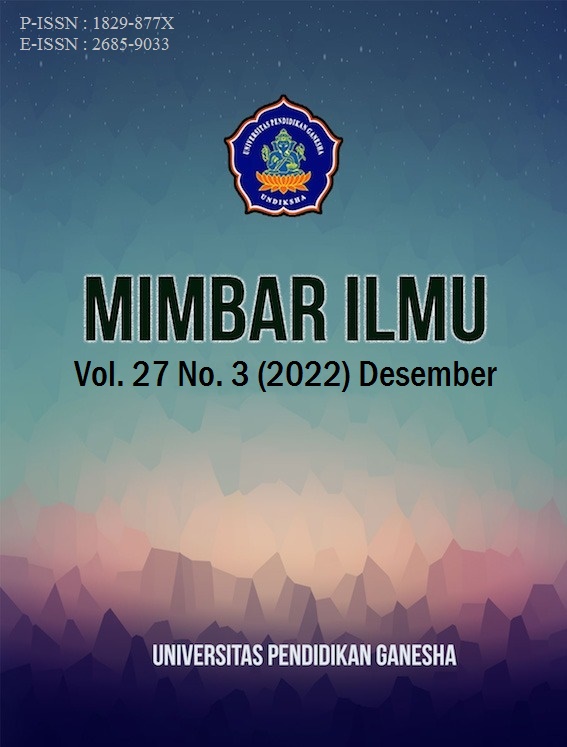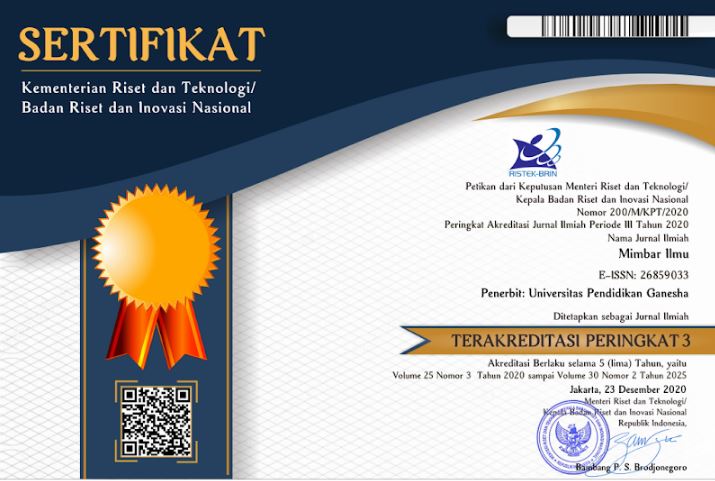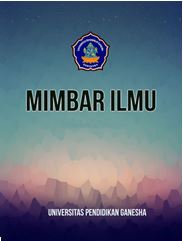Virtual Laboratory as A New Educational Trend Post Covid-19: An Effectiveness Study
DOI:
https://doi.org/10.23887/mi.v27i3.53996Kata Kunci:
Virtual Laboratory, New Educational Trend, Post Covid-19, Effectiveness StudyAbstrak
The virtual laboratory is one of the popular trends for implementing remote learning in vocational education during the COVID-19 to Post-COVID-19 pandemic, either as a substitute or as a complement to learning in a Real Laboratory. This study discusses the effectiveness analysis of the virtual laboratory as a practicum learning media to support remote or online learning implementation. The purpose of this study was to analyses the virtual laboratory's effectiveness as a learning media in the learning process of the Power Electronics Practicum in Post-COVID-19. The type of research applied is a Pre-experimental Design with a One-Group Pretest-Posttest design. The Performance Appraisal Rubric is used as an instrument to collect research data. The virtual laboratory's effectiveness is known from the difference analysis of pretest and post-test scores using the Paired Sample T-test. Meanwhile, Cohen's d effect size analysis was used to determine the effect size. The results showed that the virtual laboratory was effectively used as a practicum learning media with a large effect category. Thus, it can be concluded that the virtual laboratory can be an effective choice for implementing practical learning in supporting the implementation of remote learning.
Referensi
Abumalloh, R. A., Asadi, S., Nilashi, M., Minaei-Bidgoli, B., Nayer, F. K., Samad, S., Mohd, S., & Ibrahim, O. (2021). The impact of coronavirus pandemic (COVID-19) on education: The role of virtual and remote laboratories in education. Technology in Society, 67(September 2020), 101728. https://doi.org/10.1016/j.techsoc.2021.101728. DOI: https://doi.org/10.1016/j.techsoc.2021.101728
Alkhaldi, T., Pranata, I., & Athauda, R. I. (2016). A review of contemporary virtual and remote laboratory implementations: observations and findings. Journal of Computers in Education, 3(3), 329–351. https://doi.org/10.1007/s40692-016-0068-z. DOI: https://doi.org/10.1007/s40692-016-0068-z
Antonietti, C., Cattaneo, A., & Amenduni, F. (2022). Can teachers’ digital competence influence technology acceptance in vocational education? Computers in Human Behavior, 132. https://doi.org/10.1016/J.CHB.2022.107266. DOI: https://doi.org/10.1016/j.chb.2022.107266
Arifin, M. (2020). The Effect of Blended Learning Model with Moodle on the Students’ Writing Achievement. IJEMS:Indonesian Journal of Education and Mathematical Science, 1(2), 19. https://doi.org/10.30596/ijems.v1i2.4639. DOI: https://doi.org/10.30596/ijems.v1i2.4639
Byun, Y. J., Lee, S. H., & Kim, J. (2020). A Study on Developing the Model of Learner Satisfaction in Synchronous Online Entrepreneurship Education. International Journal of Entrepreneur and Business, 21(2). https://doi.org/10.15813/kmr.2020.21.2.007.
Cattaneo, A. A. P., Antonietti, C., & Rauseo, M. (2022). How digitalised are vocational teachers? Assessing digital competence in vocational education and looking at its underlying factors. Computers & Education, 176. https://doi.org/10.1016/J.COMPEDU.2021.104358. DOI: https://doi.org/10.1016/j.compedu.2021.104358
Chin, K. E., Kwon, D. H., Gan, Q., Ramalingam, P. X., Wistuba, I. I., Prieto, V. G., & Aung, P. P. (2021). Transition from a standard to a hybrid on-site and remote anatomic pathology training model during the coronavirus disease 2019 (covid-19) pandemic. Archives of Pathology and Laboratory Medicine, 145(1), 22–31. https://doi.org/10.5858/arpa.2020-0467-SA. DOI: https://doi.org/10.5858/arpa.2020-0467-SA
Choi, S. J., Jeong, J. C., & Kim, S. N. (2019). Impact of vocational education and training on adult skills and employment: An applied multilevel analysis. International Journal of Educational Development, 66. https://doi.org/10.1016/j.ijedudev.2018.09.007.
Choi, Su Jung, Jeong, J. C., & Kim, S. N. (2019). Impact of vocational education and training on adult skills and employment: An applied multilevel analysis. International Journal of Educational Development, 66(12), 129–138. https://doi.org/10.1016/j.ijedudev.2018.09.007. DOI: https://doi.org/10.1016/j.ijedudev.2018.09.007
Christidis, M. (2019). Vocational knowing in subject integrated teaching: A case study in a Swedish upper secondary health and social care program. Learning, Culture and Social Interaction, 21. https://doi.org/10.1016/j.lcsi.2019.01.002. DOI: https://doi.org/10.1016/j.lcsi.2019.01.002
Code, J., Ralph, R., & Forde, K. (2020). Pandemic designs for the future: perspectives of technology education teachers during COVID-19. Information and Learning Science, 121(5–6), 409–421. https://doi.org/10.1108/ILS-04-2020-0112. DOI: https://doi.org/10.1108/ILS-04-2020-0112
Day, T., Chang, I. C. C., Chung, C. K. L., Doolittle, W. E., Housel, J., & McDaniel, P. N. (2021). The Immediate Impact of COVID-19 on Postsecondary Teaching and Learning. Professional Geographer, 73(1), 1–13. https://doi.org/10.1080/00330124.2020.1823864. DOI: https://doi.org/10.1080/00330124.2020.1823864
Ding, S., & Wang, F. (2017). A New Negative Output Buck-Boost Converter with Wide Conversion Ratio. IEEE Transactions on Industrial Electronics, 64(12), 9322–9333. https://doi.org/10.1109/TIE.2017.2711541. DOI: https://doi.org/10.1109/TIE.2017.2711541
Eliza, F., Suriyadi, S., & Yanto, D. T. P. (2019). Peningkatan Kompetensi Psikomotor Siswa Melalui Model Pembelajaran Project Based Learning ( PjBL ) di SMKN 5 Padang : PDS Project. INVOTEK: Jurnal Inovasi Vokasional Dan Teknologi, 19(2). https://doi.org/10.24036/invotek.v19i2.427. DOI: https://doi.org/10.24036/invotek.v19i2.427
Estriegana, R., Medina-Merodio, J. A., & Barchino, R. (2019). Student acceptance of virtual laboratory and practical work: An extension of the technology acceptance model. Computers and Education, 135. https://doi.org/10.1016/j.compedu.2019.02.010. DOI: https://doi.org/10.1016/j.compedu.2019.02.010
Gopalan, M., Rosinger, K., & Ahn, J. Bin. (2020). Use of Quasi-Experimental Research Designs in Education Research: Growth, Promise, and Challenges. Review of Research in Education, 44(1), 218–243. https://doi.org/10.3102/0091732X20903302. DOI: https://doi.org/10.3102/0091732X20903302
Gunawan, G., Nisrina, N., Suranti, N. M. Y., Herayanti, L., & Rahmatiah, R. (2018). Virtual laboratory to improve students’ conceptual understanding in physics learning. Journal of Physics: Conference Series, 1108(1), 012049. https://doi.org/10.1088/1742-6596/1108/1/012049. DOI: https://doi.org/10.1088/1742-6596/1108/1/012049
Gunawan, Harjono, A., Hermansyah, & Herayanti, L. (2019). Guided inquiry model through virtual laboratory to enhance students’ science process skills on heat concept. Cakrawala Pendidikan, 38(2), 259–268. https://doi.org/10.21831/cp.v38i2.23345. DOI: https://doi.org/10.21831/cp.v38i2.23345
Husnaini, S. J., & Chen, S. (2019). Effects of guided inquiry virtual and physical laboratories on conceptual understanding, inquiry performance, scientific inquiry self-efficacy, and enjoyment. Physical Review Physics Education Research, 15(1). https://doi.org/10.1103/PhysRevPhysEducRes.15.010119. DOI: https://doi.org/10.1103/PhysRevPhysEducRes.15.010119
Ibrahem, U. M., Alsaif, B. S., Alblaihed, M., Ahmed, S. S. I., Alshrif, H. A., Abdulkader, R. A., & Diab, H. M. (2022). Interaction between cognitive styles and genders when using virtual laboratories and its influence on students of health college’s laboratory skills and cognitive load during the Corona pandemic. Heliyon, 8(4), 1–8. https://doi.org/10.1016/j.heliyon.2022.e09213. DOI: https://doi.org/10.1016/j.heliyon.2022.e09213
Indrawati, B. (2020). Tantangan dan Peluang Pendidikan Tinggi Dalam Masa dan Pasca Pandemi Covid-19. Jurnal Kajian Ilmiah, 1(1), 39–48. https://doi.org/10.31599/jki.v1i1.261. DOI: https://doi.org/10.31599/jki.v1i1.261
Ismaeel, D. A., & Al Mulhim, E. N. (2022). E-teaching Internships and TPACK during the Covid-19 Crisis: The Case of Saudi Pre-service Teachers. International Journal of Instruction, 15(4). https://doi.org/10.29333/iji.2022.1549a. DOI: https://doi.org/10.29333/iji.2022.1549a
Jaya, H., Haryoko, S., & Dirawan, G. D. (2016). Effectiveness the use of Virtual Laboratories in Improving Vocational Competence and Character Behavior for Students Vocational High School in Makassar. International Journal of Applied Engineering Research, 11(9), 6396–6401. http://eprints.unm.ac.id/13089/.
Jaya Saragih, M., Mas Rizky Yohannes Cristanto, R., Effendi, Y., & Zamzami, E. M. (2020). Application of Blended Learning Supporting Digital Education 4.0. Journal of Physics: Conference Series, 1566(1), 0–6. https://doi.org/10.1088/1742-6596/1566/1/012044. DOI: https://doi.org/10.1088/1742-6596/1566/1/012044
Kapilan, N., Vidhya, P., & Gao, X.-Z. (2021). Virtual laboratory: A boon to the mechanical engineering education during covid-19 pandemic. Higher Education for the Future, 8(1), 31–46. https://doi.org/10.1177/2347631120970757. DOI: https://doi.org/10.1177/2347631120970757
Korber, M., & Oesch, D. (2019). Vocational versus general education: Employment and earnings over the life course in Switzerland. Advances in Life Course Research, 40. https://doi.org/10.1016/j.alcr.2019.03.003. DOI: https://doi.org/10.1016/j.alcr.2019.03.003
Krismadinata, A., Husnaini, I., Candra, O., & Myori, D. E. (2019). Performance analysis of three-phase controlled rectifier in various switching angles. International Journal of Engineering and Advanced Technology, 9(1), 1959–1965. https://doi.org/10.35940/ijeat.A9524.109119. DOI: https://doi.org/10.35940/ijeat.A9524.109119
Kusdiyanti, H., Zanky, N., & Mokhammad Prasetyo Wati, A. (2020). Blended Learning for Augmented Reality to Increase Student Competitiveness the Filling Subject Toward Making Indonesia 4.0. KnE Social Sciences, 88–100. https://doi.org/10.18502/kss.v4i7.6845. DOI: https://doi.org/10.18502/kss.v4i7.6845
Madadizadeh, F. (2022). A tutorial on Quasi-experimental designs. Journal of Community Health Research, 11(1), 3–4. https://iranjournals.nlai.ir/bitstream/handle/123456789/916068/B056CA7D2AA0554C0E7FEFF379D08F6C.pdf?sequence=-1.
Maulana, H. A., & Iswari, R. D. (2020). Analisis Tingkat Stres Mahasiswa Terhadap Pembelajaran Daring Pada Mata Kuliah Statistik Bisnis Di Pendidikan Vokasi. Khazanah Pendidikan, 14(1), 17–30. https://doi.org/10.30595/jkp.v14i1.8479. DOI: https://doi.org/10.30595/jkp.v14i1.8479
Nolen, S. B., & Koretsky, M. D. (2018). Affordances of Virtual and Physical Laboratory Projects for Instructional Design: Impacts on Student Engagement. IEEE Transactions on Education, 61(3), 226–233. https://doi.org/10.1109/TE.2018.2791445. DOI: https://doi.org/10.1109/TE.2018.2791445
Octaberlina, L. R., & Muslimin, A. I. (2020). Efl students perspective towards online learning barriers and alternatives using moodle/google classroom during covid-19 pandemic. International Journal of Higher Education, 9(6), 1–9. https://doi.org/10.5430/ijhe.v9n6p1. DOI: https://doi.org/10.5430/ijhe.v9n6p1
Potkonjak, V., Gardner, M., Callaghan, V., Mattila, P., Guetl, C., Petrović, V. M., & Jovanović, K. (2016). Virtual laboratories for education in science, technology, and engineering: A review. Computers and Education, 95, 309–327. https://doi.org/10.1016/j.compedu.2016.02.002. DOI: https://doi.org/10.1016/j.compedu.2016.02.002
Setiawan, H., Isnaeni, W., Budijantoro, F. P. M. H., & Marianti, A. (2015). Implementation Of Learning Using Interactive Multimedia In Excretory System With Virtual Laboratory. Research and Evaluation in Education Journal, 1(2), 212–224. https://doi.org/10.21831/reid.v1i2.6501. DOI: https://doi.org/10.21831/reid.v1i2.6501
Subandowo, M., Asri Humaira, M., Rusmiati Aliyyah, R., Rachmadtullah, R., Samsudin, A., & Nurtanto, M. (2020). Use of Blended Learning with Moodle: Study Effectiveness in Elementary School Teacher Education Students during The COVID-19 pandemic Kedisiplinan dalam Manajemen kelas View project Use of Blended Learning with Moodle: Study Effectiveness in Elementary Sc. International Journal of Advanced Science and Technology, 29(7), 3272–3277. https://www.researchgate.net/profile/Achmad-Samsudin/publication/341724918_Use_of_Blended_Learning_with_Moodle_Study_Effectiveness_in_Elementary_School_Teacher_Education_Students_during_The_COVID-19_pandemic/links/5ed081c0299bf1c67d26f334/Use-of-Blended-L.
Syauqi, K., Munadi, S., & Triyono, M. B. (2020). Students’ perceptions toward vocational education on online learning during the COVID-19 pandemic. International Journal of Evaluation and Research in Education, 9(4), 881–886. https://doi.org/10.11591/ijere.v9i4.20766. DOI: https://doi.org/10.11591/ijere.v9i4.20766
Valverde-Berrocoso, J., Fernández-Sánchez, M. R., Dominguez, F. I. R., & Sosa-Díaz, M. J. (2021). The educational integration of digital technologies preCovid-19: Lessons for teacher education. PLoS ONE, 16(8 August), 1–22. https://doi.org/10.1371/journal.pone.0256283. DOI: https://doi.org/10.1371/journal.pone.0256283
Viitaharju, P., Yliniemi, K., Nieminen, M., & Karttunen, A. J. (2021). Learning experiences from digital laboratory safety training. Education for Chemical Engineers, 34, 87–93. https://doi.org/https://doi.org/10.1016/j.ece.2020.11.009. DOI: https://doi.org/10.1016/j.ece.2020.11.009
Wang, J., Zheng, Q., Song, W., & Wei, L. (2021). The Effect of Nursing Students’ Self-Efficacy on Patient-Centered Communication During the COVID-19 Pandemic: The Mediating Effect of Learning Burnout. Frontiers in Psychiatry, 12(04), 1–9. https://doi.org/10.3389/fpsyt.2021.787819. DOI: https://doi.org/10.3389/fpsyt.2021.787819
Wang, K., & Kumar, P. (2022). Virtual laboratory for understanding impact of heterogeneity on ecohydrologic processes across scales. Environmental Modelling & Software, 149, 105283. https://doi.org/10.1016/J.ENVSOFT.2021.105283. DOI: https://doi.org/10.1016/j.envsoft.2021.105283
Zakaria, N., Vouyouka, A., & Ruznan, W. S. (2022). Sustainable apparel technical and vocational education and training (TVET): integrating technology for skills training. Digital Manufacturing Technology for Sustainable Anthropometric Apparel. https://doi.org/10.1016/B978-0-12-823969-8.00003-4. DOI: https://doi.org/10.1016/B978-0-12-823969-8.00003-4
Zhou, N., Tigelaar, D. E. H., & Admiraal, W. (2022). Vocational teachers’ professional learning: A systematic literature review of the past decade. Teaching and Teacher Education, 119. https://doi.org/10.1016/J.TATE.2022.103856. DOI: https://doi.org/10.1016/j.tate.2022.103856
Unduhan
Diterbitkan
Cara Mengutip
Terbitan
Bagian
Lisensi
Hak Cipta (c) 2022 Doni Tri Putra Yanto, Maryatun Kabatiah; Hermi Zaswita; Nizwardi Jalinus, Refdinal Refdinal

Artikel ini berlisensiCreative Commons Attribution-ShareAlike 4.0 International License.
This work is licensed under a Creative Commons Attribution-ShareAlike 4.0 International License.
Authors who publish with this journal agree to the following terms:
- Authors retain copyright and grant the journal right of first publication with the work simultaneously licensed under a Creative Commons Attribution License that allows others to share the work with an acknowledgment of the work's authorship and initial publication in this journal.
- Authors are able to enter into separate, additional contractual arrangements for the non-exclusive distribution of the journal's published version of the work (e.g., post it to an institutional repository or publish it in a book), with an acknowledgment of its initial publication in this journal.
- Authors are permitted and encouraged to post their work online (e.g., in institutional repositories or on their website) prior to and during the submission process, as it can lead to productive exchanges, as well as earlier and greater citation of published work.









